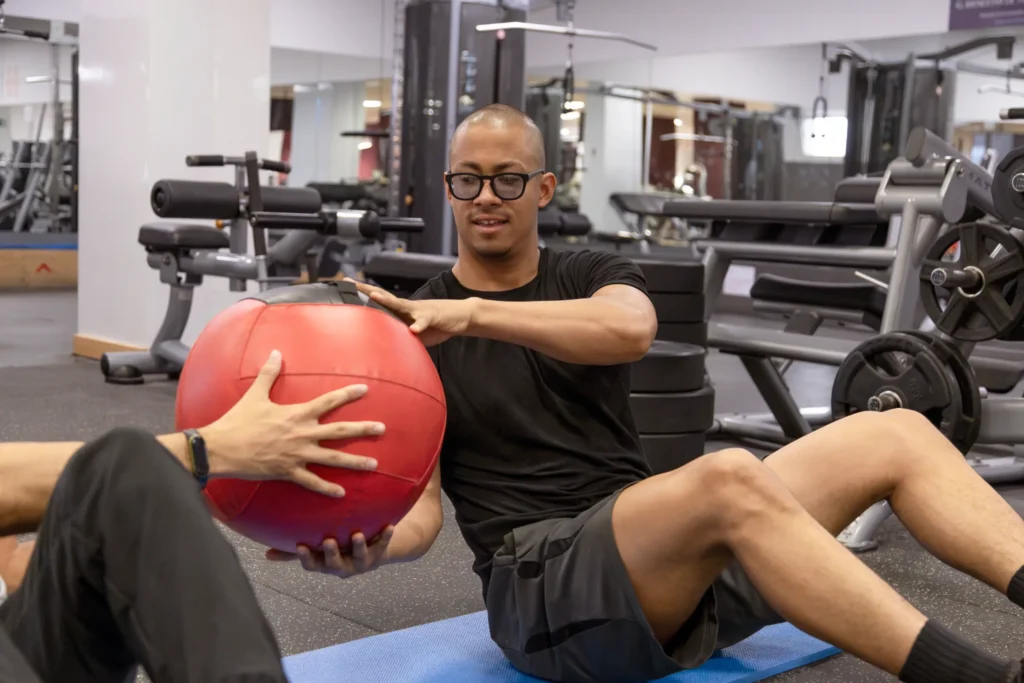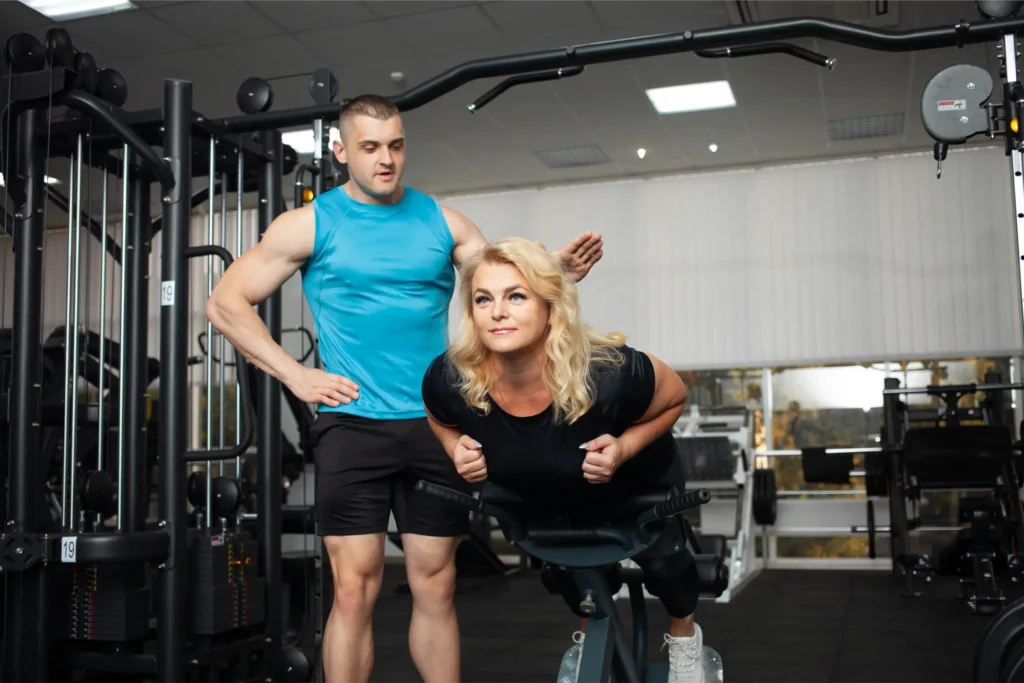Too Old to Be a Personal Trainer? Debunking the Myth and Embracing the Advantages of Age

In the fitness industry, there is a common misconception that personal training is a young person’s game. Many aspiring fitness professionals worry that they may be too old to pursue a career in personal training, fearing that they won’t be able to keep up with the physical demands of the job or connect with younger clients. However, this couldn’t be further from the truth. In this article, we’ll debunk the myth of being “too old to be a personal trainer” and explore the unique advantages that age and life experience can bring to this rewarding profession.
Challenging the Age Stereotype in the Fitness Industry
The idea that personal trainers must be young, fit, and attractive is a pervasive stereotype that has long plagued the fitness industry. This narrow view not only discourages older individuals from pursuing their passion for health and wellness but also overlooks the diverse range of skills and qualities that make a successful personal trainer.
In reality, the most effective personal trainers are those who possess a deep understanding of human physiology, exercise science, and behavior change psychology, as well as the ability to empathize, communicate, and connect with clients from all walks of life. These skills are not dependent on age, but rather on a commitment to continuous learning, personal growth, and a genuine desire to help others.
Moreover, the notion that clients only want to work with young, physically perfect trainers is a flawed assumption. Many clients, particularly those who are older or have experienced significant life challenges, may actually prefer to work with a trainer who has a greater depth of life experience and a more nuanced understanding of the obstacles and setbacks that can arise on the path to wellness.
The Advantages of Age and Life Experience in Personal Training
Far from being a hindrance, age and life experience can actually be powerful assets in the field of personal training. Older trainers often bring a wealth of knowledge, perspective, and empathy to their work, which can be invaluable in helping clients navigate the complex journey of behavior change and lifestyle transformation.
One of the key advantages of being an older personal trainer is the ability to relate to and connect with a wider range of clients. With age comes a greater understanding of the challenges and responsibilities of different life stages, from juggling career and family commitments to navigating the physical and emotional changes of menopause or retirement. This empathy and relatability can foster a deeper level of trust and rapport with clients, leading to more effective coaching and long-term success.
Age also brings a more holistic and balanced perspective to the pursuit of health and wellness. Older trainers may be less likely to buy into fad diets or extreme training methods, having witnessed firsthand the importance of sustainable, long-term lifestyle changes. They may also be more attuned to the mental and emotional aspects of wellness, recognizing that true transformation goes beyond the physical and requires a supportive, compassionate approach.
Furthermore, older personal trainers often have a wealth of professional and life experience that can enhance their coaching skills and business acumen. Many have held successful careers in other fields, honing their leadership, communication, and problem-solving abilities, which can be readily applied to the challenges of running a personal training business. They may also have a larger network of contacts and resources to draw upon, as well as a more mature and professional demeanor that can inspire confidence and trust in clients.

Embracing Age as an Opportunity for Specialization and Impact
Rather than seeing age as a limitation, older personal trainers can leverage their unique strengths and experiences to carve out a niche in the fitness industry. By specializing in working with clients in their own age group or with specific life experiences, such as menopause, retirement, or chronic illness, trainers can differentiate themselves in a crowded market and provide a valuable service to an underserved population.
For example, an older female trainer who has personally navigated the challenges of menopause may be uniquely positioned to help other women in this life stage optimize their health and well-being. A trainer who has overcome significant health challenges or disabilities may be able to connect with and inspire clients facing similar obstacles. By embracing their own life experiences and using them to inform their coaching approach, older trainers can make a profound impact on the lives of their clients and find deep fulfillment in their work.
Moreover, older personal trainers can serve as powerful role models and mentors for younger fitness professionals. By demonstrating that success in the industry is not dependent on age or physical perfection, but rather on expertise, empathy, and a commitment to lifelong learning, they can help to challenge stereotypes and create a more inclusive and diverse fitness community.
Strategies for Succeeding as an Older Personal Trainer
While age can bring many advantages to the field of personal training, it’s important for older trainers to be proactive in managing the unique challenges and considerations that come with this stage of life. This includes prioritizing their own health and well-being, setting realistic boundaries and expectations, and being strategic in their business approach.
One key strategy for succeeding as an older personal trainer is to focus on continuing education and professional development. By staying up-to-date with the latest research and best practices in exercise science, nutrition, and behavior change psychology, trainers can ensure that they are providing the most effective and evidence-based services to their clients. Pursuing advanced certifications or specializations can also help to differentiate their expertise and attract a more targeted clientele.
Another important consideration for older trainers is to be mindful of their own physical limitations and self-care needs. While it’s not necessary to be able to perform advanced athletic feats or keep up with younger clients in the gym, it is important to model healthy lifestyle habits and maintain a basic level of fitness and mobility. This may involve adapting one’s own training style or delegating certain tasks to younger colleagues, as well as prioritizing rest, recovery, and stress management techniques.
Finally, older personal trainers may need to be more strategic and proactive in their business approach, particularly if they are entering the industry as a second career or later in life. This may involve focusing on a specific niche or target market, leveraging existing networks and referral sources, and investing in targeted marketing and branding efforts. It may also require a greater emphasis on financial planning and budgeting, as well as a willingness to start small and build gradually over time.

Embracing the Journey of Lifelong Learning and Growth
Ultimately, the question of whether one is too old to be a personal trainer is a matter of mindset, not chronology. By embracing the advantages of age and life experience, and being proactive in managing the unique challenges and considerations of this stage of life, older fitness professionals can build successful, fulfilling, and impactful careers in the industry.
The key is to approach this journey with a growth mindset, a willingness to continuously learn and adapt, and a deep commitment to making a positive difference in the lives of others. By leveraging their unique strengths and experiences, and being strategic in their business approach, older personal trainers can carve out a niche in the fitness industry and serve as powerful role models and mentors for clients and colleagues alike.
At the end of the day, the most successful personal trainers are those who are passionate about helping others, committed to their own personal and professional growth, and able to connect with and inspire clients from all walks of life. Age is simply one aspect of the rich tapestry of life experience and expertise that these professionals bring to their work, and it should be celebrated, not stigmatized.
So, if you’re considering pursuing a career in personal training later in life, know that you are not too old to make a difference. Embrace the journey of lifelong learning and growth, and trust that your unique strengths and experiences will be an asset, not a hindrance, in this rewarding and impactful profession.
Am I too old to be a personal trainer?
If you’re contemplating a career as a personal trainer, then feel free to reach out to our team to discuss your options. The College of Health and Fitness has fitness courses that are suitable and we’re happy to discuss your options.
THE TOP TEN BENEFITS OF BECOMING A PERSONAL TRAINER:
- Helping others achieve their fitness goals
- Flexible work schedule
- Career growth opportunities
- Become your own boss
- Continuous learning and development
- Networking opportunities
- Active and healthy lifestyle
- Emotionally rewarding work
- Variety in the work environment
- Potential for specialisation
